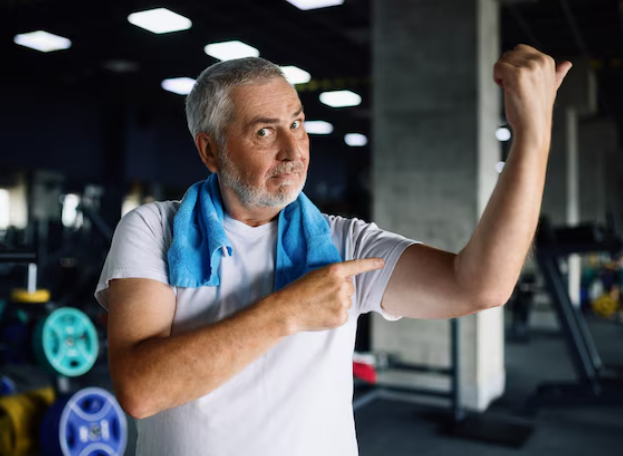In today’s busy and often stressful world, maintaining good physical and mental health is more important than ever. The gym isn’t just about building muscles or losing weight — it’s a powerful space where you can work on becoming the healthiest, strongest version of yourself, inside and out.
Physical Health Benefits of the Gym
Let’s start with the physical side. Regular exercise at the gym strengthens your muscles, improves your cardiovascular system, and boosts your overall fitness. Whether you’re lifting weights, using cardio machines, or attending a group class, you’re actively supporting your heart health, improving blood circulation, and increasing lung capacity. physical and mental health


They both are of same age group person But upper person in the picture is healthy and fit without an y disease ,But the person you seeing in the lower image is unhealthy having a health issues of diabetes, high cholesterol and excess fat
Over time, gym workouts help you burn fat, build lean muscle, and manage your weight more effectively. This reduces the risk of chronic illnesses like heart disease, diabetes, high blood pressure, and obesity. Plus, it improves your posture, flexibility, and balance, which can prevent injuries and help you move more comfortably in everyday life. physical and mental health
Even just 30 to 45 minutes a few times a week can make a big difference in how your body functions — and how you feel in your body.
Mental Health Benefits of the Gym
Now let’s talk about the mental side, which is just as important — if not more. Exercise is proven to release endorphins, the “feel-good” hormones that naturally improve your mood. Many people who struggle with stress, anxiety, or mild depression find that regular workouts help them feel calmer, more focused, and more positive.
The gym can also become your personal outlet — a place where you disconnect from daily stress, clear your head, and focus solely on yourself. That time becomes a mental break from screens, work, and outside pressures. It’s just you, your body, and your goals. physical and mental health
As you start to see physical progress — maybe lifting heavier weights or running longer distances — you’ll likely feel more confident, capable, and in control of your life.
Building a Habit That Supports Your Well-being
Making the gym a regular part of your routine is one of the best investments you can make in your physical and mental health. It doesn’t have to be extreme — you don’t need to become a bodybuilder or run marathons. What matters is showing up, moving your body, and staying consistent.
The benefits go far beyond the gym walls. When your body feels strong and your mind feels clear, every part of your life improves — from your relationships to your work performance, and even how you handle challenges.
How Lifelong Exercise Supports Our Body and Mind as We Age
As we grow older, it’s natural for our bodies and minds to go through changes. Joints may feel stiffer, energy levels may dip, and memory might not be as sharp as it once was. But if you’ve made regular exercise a part of your life from a young age, the benefits of that habit truly shine as you age.
The Long-Term Impact on Physical Health

Staying active from a young age helps build a strong foundation for your body. When you regularly move, stretch, lift, and challenge your physical limits, you’re not just improving how you feel in the moment — you’re preparing your body to stay mobile, strong, and independent in later years. physical and mental health
People who’ve exercised consistently tend to maintain better posture, joint health, and muscle strength as they age. This reduces the risk of falls, injuries, and age-related conditions like osteoporosis or arthritis. Their heart and lungs are typically stronger too, which means they’re more likely to avoid chronic illnesses like heart disease, high blood pressure, and type 2 diabetes.
And let’s not forget flexibility and balance. These often decline with age, but lifelong exercisers usually find it easier to stay agile and steady on their feet. That’s a huge win when it comes to maintaining independence in older adulthood.
Protecting Mental Health as You Age
The benefits of exercise go well beyond just physical strength — your brain gets stronger too. Regular exercise supports healthy blood flow to the brain, which helps preserve memory, focus, and mental clarity. Those who have been active most of their lives are often better at managing stress, staying emotionally balanced, and adapting to changes that come with aging.
Exercise also reduces the risk of mental health conditions like depression and anxiety, which can become more common in older adults due to isolation or life transitions. By maintaining an active lifestyle, you’re giving your brain the tools it needs to stay sharp and resilient. physical and mental health

Aging with Strength, Confidence, and Joy
The great thing about regular exercise is that it pays off over time. It’s not about being the fittest person in the gym — it’s about giving yourself the best shot at living a long, healthy, and independent life.
Those who have made fitness a lifelong habit often find that aging feels a little less daunting. They move with more ease, stay socially engaged, sleep better, and handle stress more effectively. In short, their overall physical and mental health is stronger, more stable, and better prepared for the natural changes of aging.